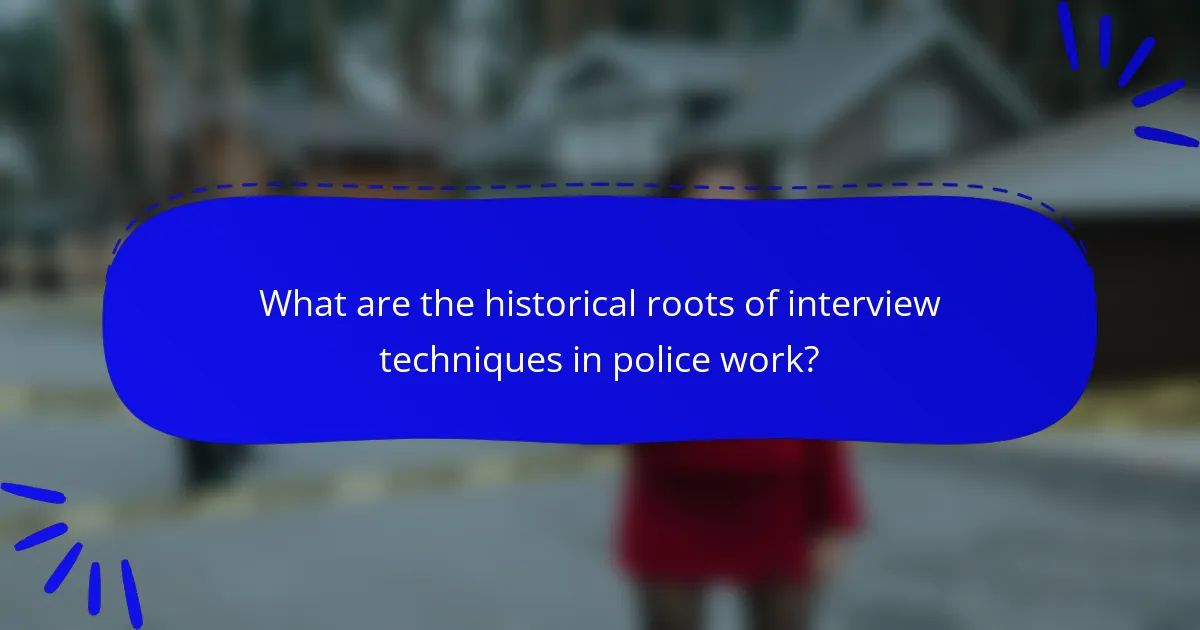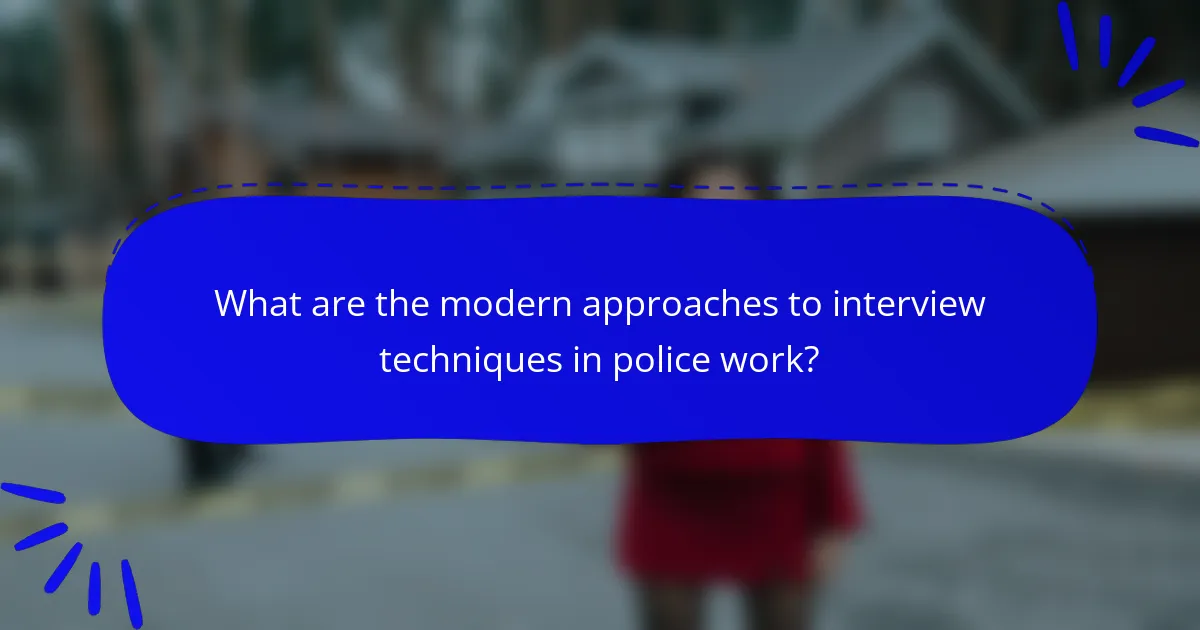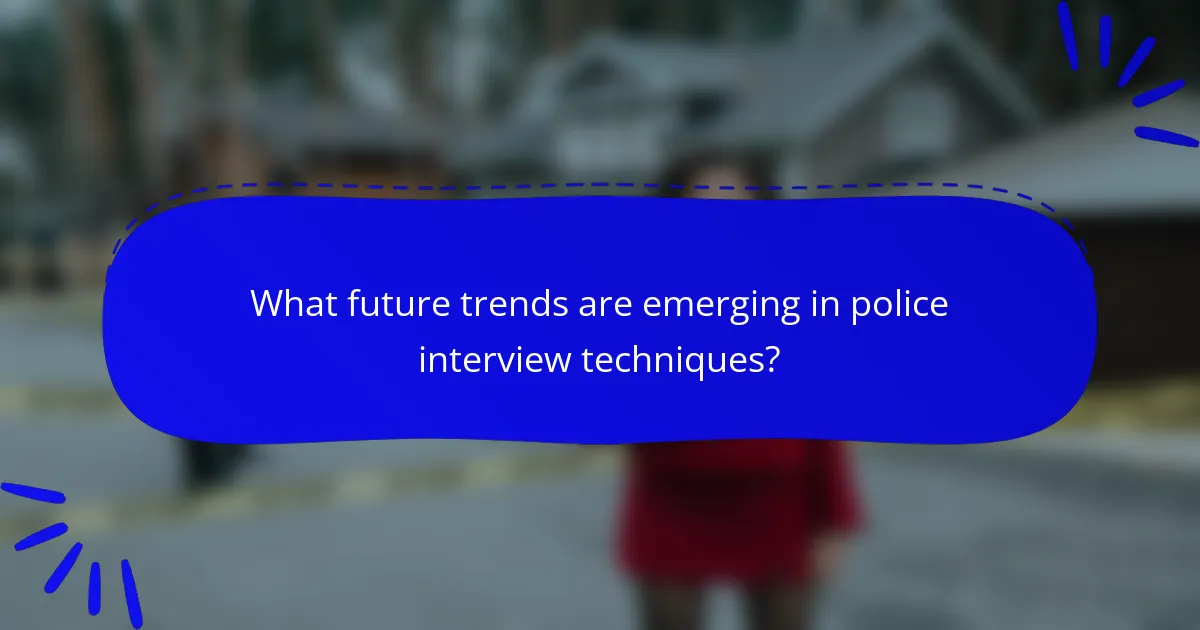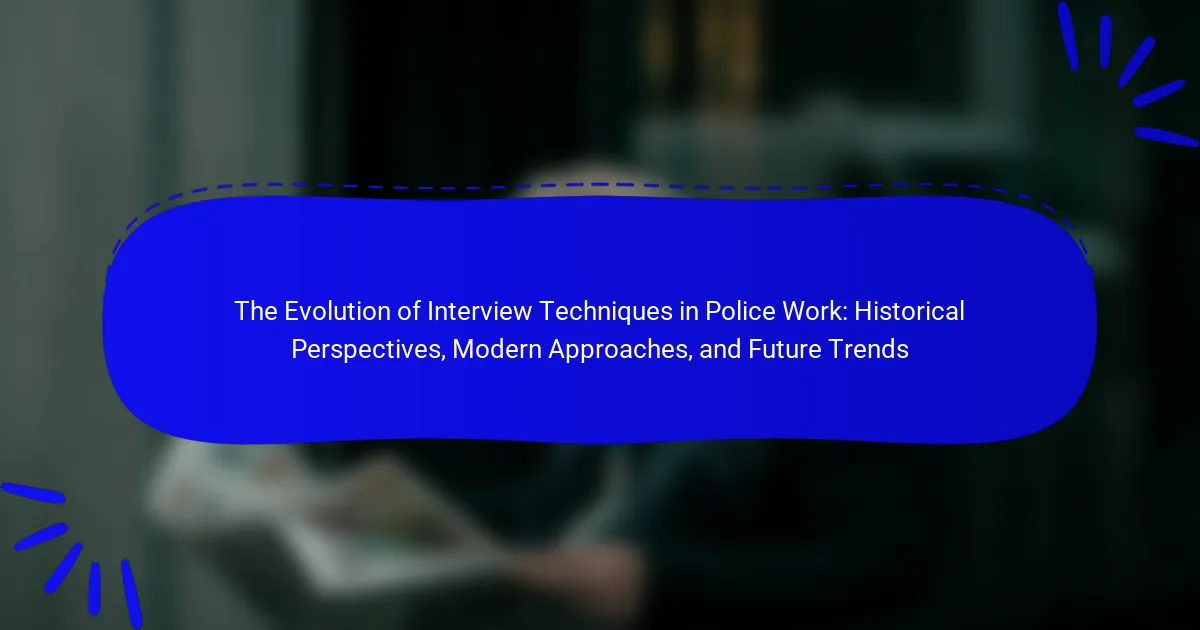
What are the historical roots of interview techniques in police work?
Interview techniques in police work have historical roots that trace back to the early 20th century. The Reid Technique, developed in the 1950s by John E. Reid, became a cornerstone in investigative interviewing. Prior to this, police relied heavily on coercive methods and confessions obtained under duress. The shift towards more psychological approaches emerged from research in social psychology. These studies emphasized the importance of rapport-building and understanding human behavior during interviews. The development of the PEACE model in the 1990s in the UK further refined these techniques. This model focused on planning and preparation, engaging with the interviewee, and evaluating the information obtained. Collectively, these historical advancements shaped modern interview techniques in police work.
How have early interrogation methods influenced modern practices?
Early interrogation methods have significantly shaped modern practices. Traditional techniques often relied on coercion and psychological manipulation. These methods laid the groundwork for understanding human behavior in high-pressure situations.
Modern interrogation practices have shifted towards rapport-building and ethical considerations. Techniques now emphasize the importance of psychological comfort for the interviewee. Research indicates that non-coercive approaches yield more reliable information.
For example, the Reid Technique, developed in the 1950s, evolved from earlier methods but incorporates ethical interviewing principles. Studies show that rapport-based interviews can increase the accuracy of information obtained.
Overall, the transition from coercive to collaborative methods reflects an understanding of the psychological aspects of interrogation. This evolution continues to influence training programs for law enforcement today.
What were the key techniques used in historical police interviews?
Key techniques used in historical police interviews included the use of direct questioning, rapport building, and the Reid Technique. Direct questioning involved asking straightforward questions to elicit clear responses. Rapport building aimed to create a connection with the interviewee, encouraging openness. The Reid Technique, developed in the 1950s, focused on behavioral analysis and psychological manipulation to obtain confessions. Historical practices also included the use of leading questions to guide responses. These techniques evolved over time, influenced by psychological research and the need for more ethical practices.
How did societal attitudes toward crime and punishment shape these techniques?
Societal attitudes toward crime and punishment significantly influenced the development of interview techniques in police work. As societies evolved, their perceptions of justice shifted from retribution to rehabilitation. This transformation led to a greater emphasis on understanding the psychological aspects of criminal behavior.
In the early 20th century, harsher punitive measures dominated, resulting in aggressive interrogation methods. However, as the understanding of human psychology grew, techniques became more focused on rapport-building and communication. Research indicated that building trust could yield more reliable information from suspects.
The shift towards a more empathetic approach reflects a broader societal belief in rehabilitation over punishment. This change is evident in modern techniques, such as the PEACE model, which emphasizes ethical interviewing and the importance of gathering accurate information without coercion.
Statistics show that non-coercive techniques can lead to higher confession rates and more accurate information. Thus, societal attitudes have directly shaped the evolution of police interview techniques, moving from coercion to collaboration.
What significant milestones mark the evolution of interview techniques?
Significant milestones in the evolution of interview techniques include the development of the Reid Technique in the 1950s. This method emphasized psychological manipulation to elicit confessions. In the 1980s, the PEACE model emerged in the UK, focusing on ethical interviewing and rapport building. The introduction of video recording in interviews in the 1990s enhanced transparency and accountability. Research in the 2000s highlighted the importance of cognitive interviewing for improving recall. The shift towards evidence-based practices in recent years has led to the integration of behavioral analysis. Each milestone reflects a growing understanding of psychology and ethics in law enforcement interviews.
Which landmark cases led to changes in police interviewing practices?
The landmark case of Miranda v. Arizona (1966) led to significant changes in police interviewing practices. This case established the requirement for police to inform suspects of their rights to silence and legal counsel. The ruling aimed to protect against self-incrimination during interrogations. Another pivotal case is Reid v. Georgia (1980), which reinforced the need for voluntary confessions. This case emphasized that coercive techniques could invalidate a confession. The case of Frazier v. Cupp (1969) also impacted interviewing methods by addressing the admissibility of confessions obtained under questionable circumstances. These cases collectively shifted police practices towards ensuring the rights of individuals during interviews.
How did advancements in psychology impact police interview strategies?
Advancements in psychology significantly impacted police interview strategies by introducing scientifically backed techniques. The incorporation of psychological principles improved the understanding of human behavior during interviews. Techniques such as rapport-building and cognitive interviewing emerged from psychological research. These methods enhance the accuracy of witness recollections and reduce the likelihood of false confessions. Studies indicate that cognitive interviewing can increase the amount of information recalled by witnesses by up to 40%. Furthermore, understanding psychological factors, such as stress and memory, informs interviewers on how to approach suspects and witnesses effectively. Overall, these advancements have led to more effective and reliable police interview practices.

What are the modern approaches to interview techniques in police work?
Modern approaches to interview techniques in police work emphasize rapport-building and cognitive interviewing. These techniques prioritize establishing trust and a comfortable environment for the interviewee. Cognitive interviewing encourages witnesses and suspects to recall details without leading questions. This method has shown to improve the accuracy of information retrieved.
Additionally, the use of technology, such as video recording, enhances transparency and accountability during interviews. Training in psychological principles helps officers understand the dynamics of communication. Research indicates that these modern techniques lead to better outcomes in investigations. For example, studies show cognitive interviewing can increase recall accuracy by up to 35%.
Incorporating these methods reflects a shift towards more ethical and effective policing practices.
How do contemporary interview techniques differ from historical methods?
Contemporary interview techniques differ from historical methods primarily in their focus on psychological principles and rapport-building. Historical methods often relied on direct questioning and interrogation tactics. Contemporary approaches emphasize understanding the interviewee’s perspective and creating a comfortable environment. Research indicates that building rapport can lead to more accurate information retrieval. Techniques such as the Cognitive Interview, developed in the 1980s, prioritize memory recall through open-ended questions. Additionally, modern interviews utilize technology, like video recording, to analyze body language and verbal cues. These advancements reflect a shift towards more ethical and effective interviewing practices.
What role does technology play in current police interviewing?
Technology plays a significant role in current police interviewing. It enhances the accuracy and efficiency of information gathering. Digital recording devices capture interviews verbatim, ensuring reliable evidence. Software applications assist in analyzing verbal and non-verbal cues. Body-worn cameras provide visual context during interactions. Artificial intelligence tools help in assessing witness credibility. Data management systems streamline case documentation and retrieval. These technological advancements improve the overall effectiveness of police investigations.
How do modern training programs prepare officers for effective interviewing?
Modern training programs prepare officers for effective interviewing through structured techniques and psychological principles. They emphasize building rapport with interview subjects. Officers learn to use open-ended questions to elicit detailed responses. Training includes role-playing scenarios to practice real-life interviewing. Programs incorporate behavioral analysis to interpret verbal and non-verbal cues. Officers receive instruction on active listening skills to enhance information retention. Continuous assessment and feedback are integral to training effectiveness. Research indicates that these methods significantly improve the quality of interviews conducted by law enforcement.
What psychological principles are applied in modern police interviews?
Modern police interviews apply various psychological principles to enhance the effectiveness of information gathering. Key principles include rapport building, cognitive interviewing, and the use of open-ended questions. Rapport building helps establish trust between the interviewer and the interviewee. This trust can lead to more accurate and detailed information being shared. Cognitive interviewing techniques focus on enhancing memory recall by encouraging witnesses to recreate the context of the event. Open-ended questions allow interviewees to provide more comprehensive responses, reducing the risk of leading them to specific answers. Research shows that these techniques can significantly improve the quality of information obtained during interviews. For instance, studies indicate that cognitive interviewing can increase recall by up to 35%.
How does the cognitive interview technique enhance information retrieval?
The cognitive interview technique enhances information retrieval by facilitating better memory recall. It encourages witnesses to recreate the context of the event. This includes recalling sights, sounds, and emotions experienced during the incident. By using open-ended questions, it allows for more detailed responses. The technique also minimizes leading questions, reducing the risk of false memories. Research shows that cognitive interviews can increase the amount of accurate information recalled by up to 35%. Studies indicate that this method is particularly effective for complex or traumatic events. Overall, the cognitive interview technique significantly improves the quality and quantity of information obtained from witnesses.
What are the ethical considerations in modern police interviewing?
Ethical considerations in modern police interviewing include the protection of rights, informed consent, and the prevention of coercion. Police must ensure that interviews do not violate the legal rights of individuals. This includes respecting the right to remain silent and the right to legal counsel. Informed consent is crucial; individuals should understand the purpose of the interview and what it entails. Coercive tactics, such as threats or deception, are considered unethical and can lead to false confessions. The use of recording devices promotes transparency and accountability. Training on ethical interviewing practices is essential for law enforcement personnel. These considerations align with the broader legal and moral standards expected in modern policing.

What future trends are emerging in police interview techniques?
Future trends in police interview techniques include the integration of technology and psychological principles. Advanced tools like artificial intelligence will assist in analyzing verbal and non-verbal cues. Virtual reality training is expected to enhance interview skills for officers. Additionally, a focus on trauma-informed interviewing will improve rapport with victims and witnesses. Research indicates that understanding cognitive biases can lead to more effective questioning. Enhanced training programs will prioritize ethical considerations in interviews. These trends aim to increase accuracy and reduce false confessions in police work.
How might technology further transform police interviewing in the future?
Technology will likely enhance police interviewing through advanced data analysis and AI tools. These tools can analyze verbal and non-verbal cues more effectively. For instance, AI can detect stress indicators in voice patterns. This can lead to more accurate assessments of truthfulness. Additionally, virtual reality could simulate interview scenarios for training purposes. This immersive training can improve officers’ skills in real situations. Furthermore, body-worn cameras can provide real-time feedback and documentation of interviews. This ensures transparency and accountability in the process. As technology progresses, these innovations will likely lead to more effective and reliable interviewing techniques in law enforcement.
What innovations are on the horizon for enhancing interview accuracy?
Innovations on the horizon for enhancing interview accuracy include advanced AI-driven analysis tools. These tools can assess verbal and non-verbal cues during interviews. Machine learning algorithms will identify patterns in responses that indicate truthfulness or deception. Virtual reality simulations may also be used for training interviewers in realistic scenarios. Additionally, biometric technologies could provide insights into physiological responses during questioning. Research indicates that combining these technologies can significantly improve the accuracy of interview outcomes. For instance, a study by the National Institute of Justice highlights the effectiveness of AI in analyzing interview data.
How could societal changes influence future interviewing practices?
Societal changes could significantly influence future interviewing practices in police work. Increased emphasis on transparency and accountability will likely shape how interviews are conducted. As communities demand more ethical policing, officers may adopt more participatory interviewing techniques. Technology advancements, such as AI and virtual reality, could also transform traditional interviewing methods. These tools may provide more immersive and interactive experiences for both interviewers and subjects. Furthermore, shifting cultural attitudes towards mental health may lead to a greater focus on psychological techniques in interviews. Research indicates that empathetic approaches can yield better information from subjects. Consequently, police training programs may evolve to incorporate these societal trends.
What best practices should police officers adopt for effective interviewing?
Police officers should adopt several best practices for effective interviewing. First, they must establish rapport with the interviewee. Building trust encourages open communication. Officers should ask open-ended questions to elicit detailed responses. This approach allows interviewees to provide more information. Active listening is crucial; officers must pay close attention to verbal and non-verbal cues. Taking notes can help retain important details during the interview. Officers should remain neutral and avoid leading questions to prevent bias. Additionally, creating a comfortable environment can enhance the interviewee’s willingness to share. Research indicates that these practices improve the quality of information gathered during interviews.
How can officers build rapport with interview subjects to improve outcomes?
Officers can build rapport with interview subjects by demonstrating empathy and active listening. Empathy involves understanding the subject’s feelings and perspectives. Active listening requires officers to focus on the subject’s words without interruption. Research shows that rapport-building techniques can lead to more truthful responses. A study by the International Association of Chiefs of Police found that effective communication increases the likelihood of obtaining accurate information. Officers should also establish a comfortable environment to encourage openness. Using open-ended questions fosters a dialogue that can enhance trust. Additionally, maintaining a non-threatening demeanor can help subjects feel safe. These strategies collectively improve interview outcomes.
What strategies can be employed to mitigate biases during interviews?
Structured interviews can mitigate biases during interviews. This approach standardizes questions for all candidates. It reduces variability in responses and focuses on relevant qualifications. Training interviewers on bias awareness is also effective. Educated interviewers are more likely to recognize their own biases. Implementing diverse interview panels can provide varied perspectives. This diversity helps counteract individual biases. Using scoring rubrics for candidate evaluation ensures objective assessments. Rubrics promote consistency in how responses are rated. Finally, conducting post-interview reviews can identify potential biases in decision-making. This reflection allows organizations to refine their interview processes.
The main entity of the article is police interview techniques, which have evolved significantly over time. The article explores the historical roots of these techniques, including the shift from coercive methods to psychological approaches like the Reid Technique and the PEACE model. It discusses how societal attitudes towards crime and punishment have influenced these practices, as well as key milestones and landmark cases that have shaped modern interviewing methods. Additionally, the article examines contemporary approaches, the role of technology, psychological principles applied in interviews, and emerging trends that are likely to influence future practices in police work.
